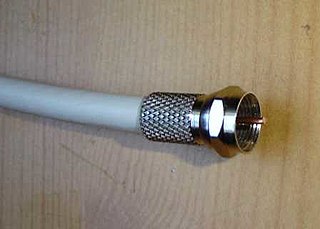
Cable television is a system of delivering television programming to consumers via radio frequency (RF) signals transmitted through coaxial cables, or in more recent systems, light pulses through fiber-optic cables. This contrasts with broadcast television, in which the television signal is transmitted over the air by radio waves and received by a television antenna attached to the television; or satellite television, in which the television signal is transmitted by a communications satellite orbiting the Earth and received by a satellite dish on the roof. FM radio programming, high-speed Internet, telephone services, and similar non-television services may also be provided through these cables. Analog television was standard in the 20th century, but since the 2000s, cable systems have been upgraded to digital cable operation.

An electrical telegraph was a point-to-point text messaging system, used from the 1840s until better systems became widespread. It used coded pulses of electric current through dedicated wires to transmit information over long distances. It was the first electrical telecommunications system, the most widely used of a number of early messaging systems called telegraphs, devised to send text messages more rapidly than written messages could be sent.

Censorship and the issue of Media freedom in Russia have been main themes since the era of the telegraph. Radio was a major new technology in the 1920s, when the Communists had recently come to power. Soviet authorities realized that the "ham" operator was highly individualistic and encouraged private initiative– too much so for the totalitarian regime. Criminal penalties were imposed but the working solution was to avoid broadcasting over the air. Instead radio programs were transmitted by copper wire, using a hub and spoke system, to loudspeakers in approved listening stations, such as the "Red" corner of a factory. Due to the enormous size of the country Russia today leads in the number of TV broadcast stations and repeaters. There were few channels in the Soviet time, but in the past two decades many new state-run and private-owned radio stations and TV channels appeared.
Telecommunications in Saudi Arabia have evolved early in the Kingdom since the establishment the Directorate of Post, Telephone and Telegraph (PTT) in 1926.
Telecommunications in Tanzania include radio, television, fixed and mobile telephones, and the Internet available in mainland Tanzania and the semiautonomous Zanzibar archipelago.
The liberalisation of Bangladesh's telecommunications sector began with small steps in 1989 with the issuance of a licence to a private operator for the provision of inter alia cellular mobile services to compete with Bangladesh Telegraph and Telephone Board (BTTB), the previous monopoly provider of telecommunications services within Bangladesh. Significant changes in the number of fixed and mobile services deployed in Bangladesh occurred in the late 1990s and the number of services in operation have subsequently grown exponentially in the past five years.
The television industry in India is very diverse and produces thousands of programs in many of India's official languages. More than half of all Indian households own a television. As of 2016, the country had over 857 channels of which 184 were pay channels.

Mercury Communications was a national telephone company in the United Kingdom, formed in 1981 as a subsidiary of Cable & Wireless, to challenge the then-monopoly of British Telecom (BT). Mercury was the first competitor to BT, and although it proved only moderately successful at challenging their dominance, it was to set the path for new communication companies to attempt the same.
Cogeco Inc. is a Canadian telecommunications and media company headquartered in Montreal, Quebec, which serves residential and commercial customers through various subsidiaries. The company provides cable television, telephone, and Internet connectivity services to consumers in parts of Ontario, Quebec, and some regions of the United States. Its subsidiaries operate radio stations and a public transit advertising company in Nova Scotia, as well as possible business telecommunications and information technology services through its fibre-optic and data centre network. Cogeco is an acronym for Compagnie Générale de Communication.

The Cable Communications Policy Act of 1984 was an act of Congress passed on October 30, 1984 to promote competition and deregulate the cable television industry. The act established a national policy for the regulation of cable television communications by federal, state, and local authorities. Conservative Senator Barry Goldwater of Arizona wrote and supported the act, which amended the Communications Act of 1934 with the insertion of "Title VI—Cable Communications". After more than three years of debate, six provisions were enacted to represent the intricate compromise between cable operators and municipalities.

Türk Telekom is the formerly state-owned Turkish telecommunications company. Türk Telekom was separated from Turkish Post (PTT) in 1995. In November 2005, it was privatized to Oger Telecom.

Regulation of the telephone numbers in Serbia is under the responsibility of the Regulatory Agency of Electronic Communication and Mail Services (RATEL), independent from the government. The country calling code of Serbia is +381. The country has an open telephone numbering plan, with most numbers consisting of a 2- or 3-digit calling code and a 6-7 digits of customer number.
Satview is a cable television Master System Operator in the United States, with franchise cable television systems in the State of Nevada. Satview offers Video, High Speed Internet and Telephone Service in Battle Mountain, Elko, Topaz Lake, Nevada. The operator serves mainly rural towns and cities. It has cable franchises in Elko, Douglas and Lander County, Nevada.
Headend in the Sky (HITS) is Comcast's satellite multiplex service that provides cable channels to cable television operations.
Like many developed and developing countries, the Internet in Bangladesh has witnessed significant growth. Although facing many constraints in expanding Internet access and use, development of the Internet and Information Technology are high government priorities. In April, 2019 Internet users in Bangladesh increased to 93.702 million. On 19 February 2018, Bangladesh started the 4G network service.

Multichannel News is a magazine and website published by Future US that covers multichannel television and communications providers, such as cable operators, satellite television firms and telephone companies, as well as emerging Internet video and communication services.

Amateur radio, also known as ham radio, is the use of radio frequency spectrum for purposes of non-commercial exchange of messages, wireless experimentation, self-training, private recreation, radiosport, contesting, and emergency communication. The term "amateur" is used to specify "a duly authorised person interested in radioelectric practice with a purely personal aim and without pecuniary interest;" and to differentiate it from commercial broadcasting, public safety, or professional two-way radio services.
The distribution of cable television around the world:

TOYA is a Polish cable and digital television and telecommunications provider with headquarters in Łódź. The company's network is one of the largest in the country and covers eight cities – Łódź, Kraków, Mysłowice, Kutno, Przemyśl, Piotrków Trybunalski, Pisz and Pabianice. TOYA products and services are also available in thirteen partner networks of other operators across 25 locations. Apart from delivering cable and digital TV, Internet access and VoIP, the company runs several media and cultural projects.









